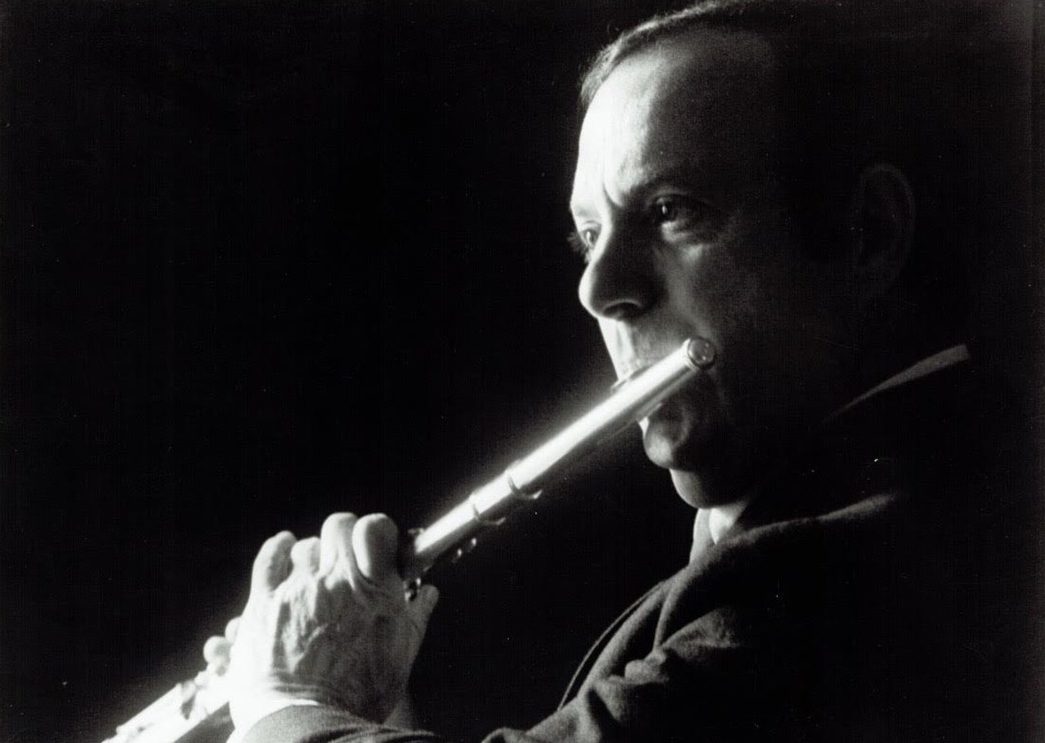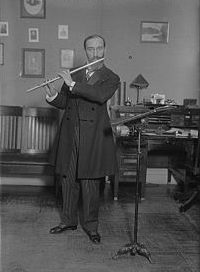On 22 February 2014, I had the privilege of meeting Bernard Goldberg (1923-2017) for the first time. Mr. Goldberg, or “Bernie” as many knew him, played principal flute in the Pittsburgh Symphony Orchestra from 1946 to 1993. Celebrated French flutist and pedagogue Marcel Moyse (1889-1984) considered Bernie his successor. Bernie also was one of the last pupils of Georges Barrère (1876-1944), who had been a student of Joseph-Henri Altès (1826-1895) and Paul Taffanel (1844-1908), two exemplars of the French flute school.

During the time I knew Bernie, I studied privately with him during his visits to Chicago and accompanied him on his final two teaching tours in the Midwest. This experience allowed me to observe many hours of his instruction in a variety of settings, including masterclasses, individual lessons, and group lessons.
In memory of Bernie’s generosity, skills, and artistry, I will present a series of three essays that chronicle the primary skills and ideas Bernie taught me during our private lessons together. Fundamental concepts of flute playing and musicianship will be my focus.
Lesson One: Flexibility, Efficiency, and Self-Listening
Flexibility, efficiency, and self-listening were the main themes of my first lesson with Bernie. Flexibility and efficiency refer to what was perhaps the central concern of Bernie’s approach to tone production—mastering how to properly angle the air column according to musical need. He advised a gentle flow of breath, and taught the fundamental principles of how to direct the lips and jaw to angle the air and achieve the optimal musical sound according to the given register or individual pitch. He imparted this knowledge in the simplest of terms. The plainness and directness were certainly part of the magic. One must realize, though, that a lifetime of study with the masters is what enabled Bernie to diagnose problems and adeptly provide solutions in such a seemingly ordinary manner.
During this specific lesson, Bernie gave particular attention to sound production in the low register. He vividly described the power of Barrère’s lower register, recalling that when the great French master played low notes, it appeared as though “his whole face drained from the eyes down to his beard.” On the specifics of low register technique, Bernie advocated the following: move the jaw vertically downward; turn the flute inward (to drive the air deeper); and push the flute forward with the footjoint (to correct for flatness).

The principle of efficiency also applies to the fingers. Bernie encouraged quiet finger technique, and provided the idea of just sinking into the keys. Choosing once again the example of his own teacher, Bernie noted that despite having large hands, Barrère did not bang at the keys. In fact, in Barrère’s view, using key clicks to facilitate tone production was an admission on the part of the performer of faulty technique. By promoting quiet keys, Bernie effectively led the student toward economy of physical effort in the fingers.
The third major theme of my first lesson with Bernie was self-listening, which he identified as the most important musical skill. It bears stating, though, that flexibility and efficiency tie into the possibilities that self-listening affords. If the player has developed a clear inner concept of the music, as well as flexible and efficient use of the body, then through self-listening, she can quickly adjust as needed when the sounds on the instrument do not match the inner ideal. Here, Bernie told a story about violinist Jascha Heifetz (1901-1987): “Somebody asked Jascha Heifetz, ‘How come you play perfectly in tune?’ He said, ‘I don’t. I adjust faster than anybody else.’” Self-listening, flexibility, and efficiency are the foundational principles behind Heifetz’s remarks.

Throughout the lesson, Bernie was encouraging and understanding, and also humorous at times. This spirit of teaching provided me confidence in my ability to succeed. In retrospect, it seems Bernie was laying the groundwork for the primary theme of my second lesson with him: good work, done with patience, provides the musician the resources she needs.